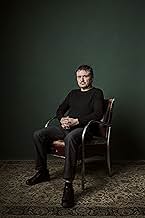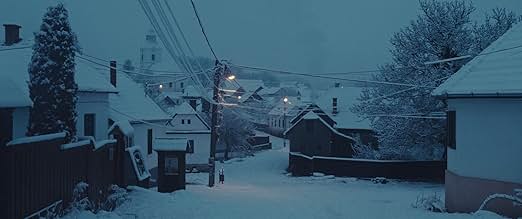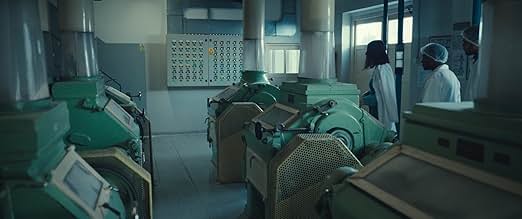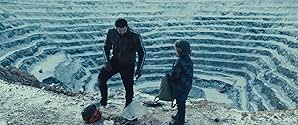PUNTUACIÓN EN IMDb
7,2/10
6,3 mil
TU PUNTUACIÓN
Un análisis sin prejuicios sobre las fuerzas motrices del comportamiento humano ante lo desconocido, sobre la forma en que percibimos al otro y sobre cómo nos relacionamos con un futuro inqu... Leer todoUn análisis sin prejuicios sobre las fuerzas motrices del comportamiento humano ante lo desconocido, sobre la forma en que percibimos al otro y sobre cómo nos relacionamos con un futuro inquietante.Un análisis sin prejuicios sobre las fuerzas motrices del comportamiento humano ante lo desconocido, sobre la forma en que percibimos al otro y sobre cómo nos relacionamos con un futuro inquietante.
- Dirección
- Guión
- Reparto principal
- Premios
- 7 premios y 18 nominaciones en total
Endre Rácz
- Tibi
- (as Rácz Endre)
Reseñas destacadas
I don't know this director from Roumania, some kind of a Roumanian Ken Loach, but I guess he is one of the best on the market. I will try to check what he did besides this one. It is not a light hearted story, it speaks of something very serious, dark, realistic, gritty. A tale about racism, intolerance, human behaviour, towards strangers, especially if they are foreigners come to work. I am sure it is like this in many countries, many places. This is not an easy topic to speak about. It is very well told, shown. It may be disturbing because too close to reality, to actual events and tragedies which we don't necessarily hear of.
RMN is the Romanian translation of "MRI" - the medical machine which takes deep images of the human body including the brain. In a way, renowned Director Cristian Mungiu (4 MONTHS, GRADUATION) is examining the inner souls of his fellow countryman. An X-Ray if you will.
Mungiu's screenplay is set in a small Transylvanian village. Mattias (Marin Grigore), a brute of a man, has returned from a job for hire in Germany to reunite with his estranged wife Ana (Macrina Barladeanu) and young son Rudi (Mark E. Blenyesi) who claims to have seen something so horrible that he can barely speak. Csilla (Judith Slate) manages a local bakery and is also Mattias' old flame. There are obvious tensions, but the town is seemingly idyllic with its snow-capped mountains, abundant livestock and quiet lifestyles.
The outward peace begins to crack when Csilla's bakery is forced to hire three migrants from Sri Lanka to keep operating. The locals have balked at working for minimum wage, but, before long they aim their ire at the black workers who they equate with invading gypsies. Soon the entire populace is riled by their presence, this despite the village's own checkered history with immigration, not to mention so many of they themselves going overseas for work - doubly so now that Romania has joined the E. U..
Mungiu's intentions are clear, but, he doesn't take a direct route. His concerns are more with exploring the inner psychological forces of the villagers' behavior more than their direct actions. The key sequence is a fifteen minute long single take which places Mattias and Csilla as the focus of the frame, while the townspeople rail on airing predictable grievances.
Mungiu's method includes a pair of visual metaphors and a premonition of sorts. The script doesn't all work and the strain of drawing it all together as a whole shows at times. Still, R. M. N. Is a reminder of how universal prejudice and the various incarnations of injustice can be. The acting by Slate and Grigore in particular is quite strong and Mungiu's rigorous intelligence make a definite impact. There are a pair of arresting images towards the end that are hauntingly effective.
Mungiu's screenplay is set in a small Transylvanian village. Mattias (Marin Grigore), a brute of a man, has returned from a job for hire in Germany to reunite with his estranged wife Ana (Macrina Barladeanu) and young son Rudi (Mark E. Blenyesi) who claims to have seen something so horrible that he can barely speak. Csilla (Judith Slate) manages a local bakery and is also Mattias' old flame. There are obvious tensions, but the town is seemingly idyllic with its snow-capped mountains, abundant livestock and quiet lifestyles.
The outward peace begins to crack when Csilla's bakery is forced to hire three migrants from Sri Lanka to keep operating. The locals have balked at working for minimum wage, but, before long they aim their ire at the black workers who they equate with invading gypsies. Soon the entire populace is riled by their presence, this despite the village's own checkered history with immigration, not to mention so many of they themselves going overseas for work - doubly so now that Romania has joined the E. U..
Mungiu's intentions are clear, but, he doesn't take a direct route. His concerns are more with exploring the inner psychological forces of the villagers' behavior more than their direct actions. The key sequence is a fifteen minute long single take which places Mattias and Csilla as the focus of the frame, while the townspeople rail on airing predictable grievances.
Mungiu's method includes a pair of visual metaphors and a premonition of sorts. The script doesn't all work and the strain of drawing it all together as a whole shows at times. Still, R. M. N. Is a reminder of how universal prejudice and the various incarnations of injustice can be. The acting by Slate and Grigore in particular is quite strong and Mungiu's rigorous intelligence make a definite impact. There are a pair of arresting images towards the end that are hauntingly effective.
Cristian Mungiu is undoubtedly the best Romanian director working nowadays. He got famous for winning the Palme d'Or in 2007 for his masterpiece "4 Months, 3 Weeks and 2 Days", but hasn't stopped making great films afterwards. "R. M. N." (Magnetic Resonance Imaging in Romanian) is no exception - a gripping social thriller which explores the melting point of socioeconomic forces and simple human emotions.
I had the enorme chance of attending a screening with Cristian Mungiu attending himself. Unlike other directors, he took more than one hour afterwards to discuss the film with the audience, not hesitating to even answer difficult questions in detail. R. M. N. Is a great film, but not an easy one as it's on purpose not filmed how an American film would be filmed (that's what Mungiu said himself) - so I was extremely happy that he explained a lot of the film, it turned out to be one of the most interesting discussions I've ever attended.
Although the film is slow, and at first difficult to access, it's worth sitting through, as Mungiu rewards audiences with an extraordinary showdown in form of a debate in a 17-minute single shot - one of the greatest scenes of the year. The event is based on a a real event of xenophobia and hate which left its mark on Romanian society a few years ago.
The film starts by introducing its protagonist, a monosyllabic man named Matthias who returns home after violently attacking the manager of the German slaughterhouse he works in. Once back in his Romanian village, more conflicts await him, as he's met by a distant wife, an emotionally damaged child and a lover who is quite the opposite of him - she turns out to be the hero of the film, the character we identify ourselves with. When I asked Mungiu why he chose to make an unsympathetic and brutal character as his protagonist, he explained that he didn't want to choose an American approach, that the audience always has to understand, like or identify with the main character. Furthermore, the contrast between the regressive and closed Matthias and the liberal Csilla is meant to portray the inner struggle of every human, the struggle between rational choices and animalistic instincts.
This conflict - inside every human, but equally for the village's inhabitants as well as the two very different lovers - gets serious when the xenophobic event takes place in the village. Without ever accusing an entire group of people, Mungiu shows how every single one is responsible individually and how ideologies clash when communities neglected in the process of globalisation face the antagonistic effects of a market without borders.
Although not a film for the masses, R. M. N. Is once again a very rewarding achievement by the Romanian director, who regularly gives us brilliant insights into an interesting country we watch not enough films from. But as he said himself, has no aspirations to make an English-language film, as long as he still lives in Romania.
I had the enorme chance of attending a screening with Cristian Mungiu attending himself. Unlike other directors, he took more than one hour afterwards to discuss the film with the audience, not hesitating to even answer difficult questions in detail. R. M. N. Is a great film, but not an easy one as it's on purpose not filmed how an American film would be filmed (that's what Mungiu said himself) - so I was extremely happy that he explained a lot of the film, it turned out to be one of the most interesting discussions I've ever attended.
Although the film is slow, and at first difficult to access, it's worth sitting through, as Mungiu rewards audiences with an extraordinary showdown in form of a debate in a 17-minute single shot - one of the greatest scenes of the year. The event is based on a a real event of xenophobia and hate which left its mark on Romanian society a few years ago.
The film starts by introducing its protagonist, a monosyllabic man named Matthias who returns home after violently attacking the manager of the German slaughterhouse he works in. Once back in his Romanian village, more conflicts await him, as he's met by a distant wife, an emotionally damaged child and a lover who is quite the opposite of him - she turns out to be the hero of the film, the character we identify ourselves with. When I asked Mungiu why he chose to make an unsympathetic and brutal character as his protagonist, he explained that he didn't want to choose an American approach, that the audience always has to understand, like or identify with the main character. Furthermore, the contrast between the regressive and closed Matthias and the liberal Csilla is meant to portray the inner struggle of every human, the struggle between rational choices and animalistic instincts.
This conflict - inside every human, but equally for the village's inhabitants as well as the two very different lovers - gets serious when the xenophobic event takes place in the village. Without ever accusing an entire group of people, Mungiu shows how every single one is responsible individually and how ideologies clash when communities neglected in the process of globalisation face the antagonistic effects of a market without borders.
Although not a film for the masses, R. M. N. Is once again a very rewarding achievement by the Romanian director, who regularly gives us brilliant insights into an interesting country we watch not enough films from. But as he said himself, has no aspirations to make an English-language film, as long as he still lives in Romania.
Cristian Mungiu is one of the "founding fathers" of the Romenian new wave that started around 2005 with movies such as "The death of Mr Lazarescu" (2005, Cristi Puiu), "12:08 East of Bucharest" (2006, Corneliu Porumboiu) and of course the breakthrough movie of Mungiu himself "4 month, 3 weeks and 2 days" (2007). More than 15 years later the Romenian new wave is still alive and kicking. In 2022 the experienced director Mungiu delivers an excellent movie with "R. M. N" but there is also the "new name" Alexandru Belc with "Metronom". New name is maybe a bit exaggerated because Belc already contributed to the script of "4 month, 3 weeks and 2 days".
"Metronom" is situated in 1972 during the Ceausescu years and is thus typical Romenian. "R. M. N" covers more general themes. It is about Matthias (Marin Grigore) and his home village. After working in Germany for a while Matthias returns to his home village. In this village three Sri Lankan workers arrive at the local bakery because vacancies are difficult to fill (many workers work in the West). The arrival of the Sri Lankan workers leads to a lot of tension in the local community.
The above description seems to indicate that "R. M. N" is above all about racism, and that is not entirely untrue. In a key scene with a duration of twenty minutes there is a meeting in the village hall. In this meeting all prejudices against the Sri Lankan (and foreigners in general) are given free reign.
In my opinion "R. M. N" is about racism but not only about racism. It is also about hypocrisy. I give a number of examples.
In the first place Romanians working in Germany is no problem, but a Sri Lankan working in Romania is.
The film is situated in Transsylvania, a region with a Hungarian minority. This minority wants not to be discriminated against, but on the other hand has no problem discriminating other people.
There are also people defending the Sri Lankan workers, but this are their employers that have an economic interest. Their defence that no Romenian reacted on the vacant positions meets with the reply that they were only willing to pay minimum wages. So their bevaviour has at least a hint of hypocrisy to it. They are certainly not the good guys against the evil and dumb majority. In the films of Mungiu there seldom is a simplistic good versus bad distinction. In this respect the portrayel of one of the empoyers (Csilla Szabo played by Judith State) as always drinking a glass of red wine and always playing the cello was already a bit too "bourgeois" to my liking.
The village of the movie is situated on the edge of a primaeval forest. This is no coincidence as the forest symbolizes mystical and animal spirits, with recurring references to brown bears. These animal spirits overtake rational thought when it comes to reacting to foreigners. This is illustrated in the meeting in the village hall (in the scene already mentioned to) when some villagers tried to wrap their prejudices in rational arguments (maybe the foreigners carry unknown viuses with them). When their argument is refuted (we let them work with protecting rubber handshoes) the prejudice inside shows itself (but we simply don't want them here).
"R. M. N" is an ominous film with mob violence constantly in the air. In this respect it resembles "Werckmeister Harmoniak" (2000, Bela Tarr), although the last mentioned film is more abstact. The resemblance was for me the most obvious in the new years day parade with people in bear costumes fighting a neighbouring village as part of a new year tradition. For me this scene was the most Tarr like combining in an abstract manner animal spirits with xenophobia. The twenty minutes scene in the village hall did the same thing, but in a much more concrete way. This scene is more characteristic of Cristian Mungiu himself.
"Metronom" is situated in 1972 during the Ceausescu years and is thus typical Romenian. "R. M. N" covers more general themes. It is about Matthias (Marin Grigore) and his home village. After working in Germany for a while Matthias returns to his home village. In this village three Sri Lankan workers arrive at the local bakery because vacancies are difficult to fill (many workers work in the West). The arrival of the Sri Lankan workers leads to a lot of tension in the local community.
The above description seems to indicate that "R. M. N" is above all about racism, and that is not entirely untrue. In a key scene with a duration of twenty minutes there is a meeting in the village hall. In this meeting all prejudices against the Sri Lankan (and foreigners in general) are given free reign.
In my opinion "R. M. N" is about racism but not only about racism. It is also about hypocrisy. I give a number of examples.
In the first place Romanians working in Germany is no problem, but a Sri Lankan working in Romania is.
The film is situated in Transsylvania, a region with a Hungarian minority. This minority wants not to be discriminated against, but on the other hand has no problem discriminating other people.
There are also people defending the Sri Lankan workers, but this are their employers that have an economic interest. Their defence that no Romenian reacted on the vacant positions meets with the reply that they were only willing to pay minimum wages. So their bevaviour has at least a hint of hypocrisy to it. They are certainly not the good guys against the evil and dumb majority. In the films of Mungiu there seldom is a simplistic good versus bad distinction. In this respect the portrayel of one of the empoyers (Csilla Szabo played by Judith State) as always drinking a glass of red wine and always playing the cello was already a bit too "bourgeois" to my liking.
The village of the movie is situated on the edge of a primaeval forest. This is no coincidence as the forest symbolizes mystical and animal spirits, with recurring references to brown bears. These animal spirits overtake rational thought when it comes to reacting to foreigners. This is illustrated in the meeting in the village hall (in the scene already mentioned to) when some villagers tried to wrap their prejudices in rational arguments (maybe the foreigners carry unknown viuses with them). When their argument is refuted (we let them work with protecting rubber handshoes) the prejudice inside shows itself (but we simply don't want them here).
"R. M. N" is an ominous film with mob violence constantly in the air. In this respect it resembles "Werckmeister Harmoniak" (2000, Bela Tarr), although the last mentioned film is more abstact. The resemblance was for me the most obvious in the new years day parade with people in bear costumes fighting a neighbouring village as part of a new year tradition. For me this scene was the most Tarr like combining in an abstract manner animal spirits with xenophobia. The twenty minutes scene in the village hall did the same thing, but in a much more concrete way. This scene is more characteristic of Cristian Mungiu himself.
Not sure what the message of the movie was supposed to be. There are two separate stories, one with a kid who saw something scary and is not able or willing to speak anymore after it, the second with a couple of immigrant workers who are not welcomed by the locals in the village.
Not much is happening in any of the stories, and definitely nothing that has not been depicted better in other movies.
The end of the movie is really, really confusing, with a woman who is asking forgiveness for something, not clear at all what exactly, then some bear figures hiding in the woods around her house... The movie left me with the sensation that I just wasted two hours that I could have spent in a better way.
Not much is happening in any of the stories, and definitely nothing that has not been depicted better in other movies.
The end of the movie is really, really confusing, with a woman who is asking forgiveness for something, not clear at all what exactly, then some bear figures hiding in the woods around her house... The movie left me with the sensation that I just wasted two hours that I could have spent in a better way.
¿Sabías que...?
- CuriosidadesMungiu named the film after a Romanian acronym for -nuclear magnetic resonance-, as the film is "an investigation of the brain, a brain scan trying to detect things below the surface".
- Banda sonoraYumenji's Theme
Composed by Shigeru Umebayashi for Deseando amar (2000)
Selecciones populares
Inicia sesión para calificar y añadir a tu lista para recibir recomendaciones personalizadas
- How long is R.M.N.?Con tecnología de Alexa
Detalles
Taquilla
- Recaudación en Estados Unidos y Canadá
- 46.360 US$
- Fin de semana de estreno en EE. UU. y Canadá
- 6121 US$
- 30 abr 2023
- Recaudación en todo el mundo
- 738.520 US$
- Duración
- 2h 5min(125 min)
- Color
- Relación de aspecto
- 2.39 : 1
Contribuir a esta página
Sugerir un cambio o añadir el contenido que falta























